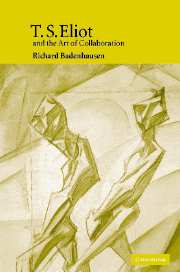Book contents
- Frontmatter
- Contents
- Acknowledgments
- List of abbreviations
- Introduction – Reaching the stillness of music
- 1 “Speaking as ourselves”: Authorship, impersonality, and the creative process in the early essays
- 2 A conversation about “the longest poem in the English langwidge”: Pound, Eliot, and The Waste Land
- 3 “Helping the poets … write for the theatre”: The transitional essays on collaboration, community, and drama
- 4 A dramatist and his midwives: Eliot's collaborations in the theatre
- 5 The Possum and the “creating critick”: Eliot's collaboration with John Hayward
- Conclusion – Placing collaboration in perspective: Voice and influence in the late essays
- Notes
- Index
Introduction – Reaching the stillness of music
Published online by Cambridge University Press: 22 September 2009
- Frontmatter
- Contents
- Acknowledgments
- List of abbreviations
- Introduction – Reaching the stillness of music
- 1 “Speaking as ourselves”: Authorship, impersonality, and the creative process in the early essays
- 2 A conversation about “the longest poem in the English langwidge”: Pound, Eliot, and The Waste Land
- 3 “Helping the poets … write for the theatre”: The transitional essays on collaboration, community, and drama
- 4 A dramatist and his midwives: Eliot's collaborations in the theatre
- 5 The Possum and the “creating critick”: Eliot's collaboration with John Hayward
- Conclusion – Placing collaboration in perspective: Voice and influence in the late essays
- Notes
- Index
Summary
This book identifies collaboration as a life-long operating procedure in T. S. Eliot's theory and practice, and it also illustrates the various ways he resisted that same assistance. Eliot's reflections upon this complicated process can be teased out of one of his poetic meditations written in 1935, the same year he visited the gardens of Burnt Norton with Emily Hale. Although “Burnt Norton” now appears as the first of Eliot's Four Quartets, the poem originally stood very much on its own. It turned up as the concluding piece in Collected Poems 1909–1935 and only began to be seen by its author as the opening of a series during the war, when he started composing additional quartets. Consequently, “Burnt Norton” should not necessarily be read as a forward-looking poem that launches themes, images, ideas, and emotions that eventually surface in those subsequent quartets. Instead, it can be understood more accurately as a summary of Eliot's past experiences and the effects of those memories upon the present-day speaker. After offering a fairly dense, philosophical discussion of time, the speaker of “Burnt Norton” declares:
Footfalls echo in the memory
Down the passage which we did not take
Towards the door we never opened
Into the rose-garden. My words echo
Thus, in your mind.
But to what purpose
Disturbing the dust on a bowl of rose-leaves
I do not know.
Other echoes
Inhabit the garden. Shall we follow?
Quick, said the bird, find them, find them,
Round the corner. Through the first gate,
Into our first world, shall we follow
The deception of the thrush? Into our first world.
There they were, dignified, invisible,
Moving without pressure, over the dead leaves,
In the autumn heat, through the vibrant air,
And the bird called, in response to
The unheard music hidden in the shrubbery,
And the unseen eyebeam crossed, for the roses
Had the look of flowers that are looked at.
There they were as our guests, accepted and accepting
- Type
- Chapter
- Information
- T. S. Eliot and the Art of Collaboration , pp. 1 - 26Publisher: Cambridge University PressPrint publication year: 2005



